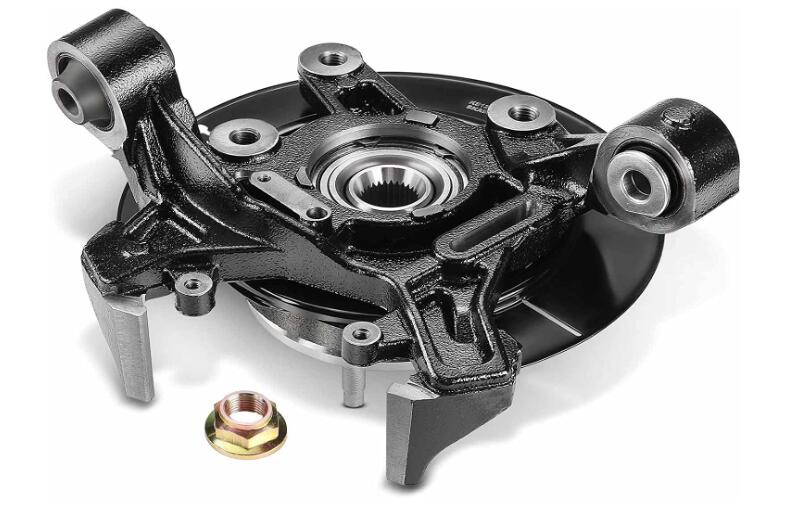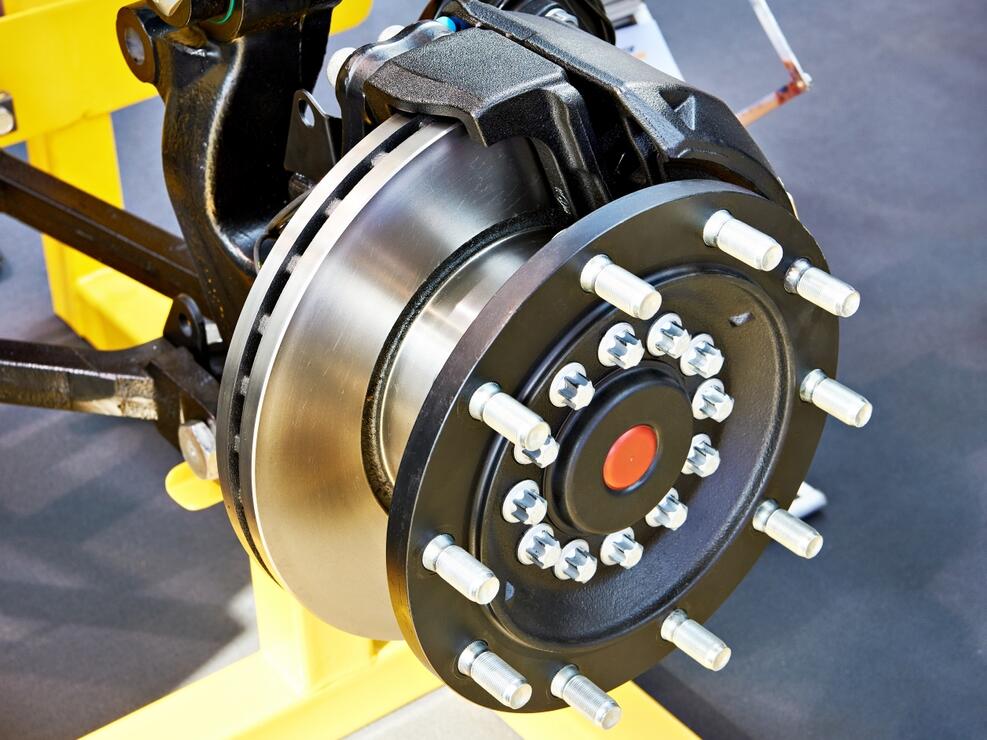Introduction
At first glance, wheel hub bolts may seem like unremarkable, valuable parts of a vehicle, but their role is indispensable.
Wheel hub bolts are designed to withstand the car’s weight, the forces from driving, braking, and steering.
As a leading manufacturer in the automotive industry, every vehicle owner must understand the nuances of these bolts – their materials, designs, and applications.
This comprehensive guide aims to provide in-depth insights into wheel hub bolts.
Material of Wheel Hub Bolts: Strength and Durability
The primary function of wheel hub bolts is to secure the wheel to the vehicle, thereby requiring materials that exhibit high strength and durability.
Most hub bolts are made from alloy steel, known for their high tensile strength and ability to withstand enormous loads and pressures.
Manufacturers, including ourselves, often use materials like chromium-vanadium steel.
These materials are highly resistant to wear and tear and immune to harsh weather conditions, providing long-lasting durability.
Some modern hub bolts are made from titanium or aluminum alloys.
Although lighter than steel, they have similar, if not superior, strength-to-weight ratios.
These lightweight materials reduce the vehicle’s weight, improving fuel efficiency.
However, they are usually more expensive and are commonly used in high-performance or luxury vehicles.
Design of Wheel Hub Bolts: Precision Engineering
Wheel hub bolts are precision-engineered components. They are carefully designed to fit specific makes and models of vehicles.
The primary parameters considered in bolt design include the bolt’s diameter, length, and thread pitch.
The bolt head’s design is also crucial as it needs to allow for secure fastening and easy removal when necessary.
Various bolt head designs are available, including hexagonal heads, which are the most common, and socket or Allen’s heads, which provide more contact surfaces for tighter fastening.
The design choice depends on factors such as the vehicle’s design, cost considerations, and the manufacturer’s preference.
Wheel hub bolts often undergo additional treatments to enhance durability and prevent corrosion.
For instance, they may be coated with zinc, dacromet, or other protective layers that resist rust and degradation.
This attention to detail in design ensures a reliable, long-lasting bolt.
Application of Wheel Hub Bolts: Ensuring Safety and Performance
Wheel hub bolts directly impact a vehicle’s safety and performance. Their primary role is securing the wheels to the vehicle’s hub. As such, they are crucial to vehicle safety.
A loose or broken wheel bolt can detach the wheel, leading to a severe accident. Similarly, over-tightened bolts can damage the wheel or hub, leading to compromised performance or unexpected failure.
The performance aspect of wheel hub bolts lies in their contribution to the vehicle’s overall weight.
As mentioned, using lightweight materials in wheel hub bolts can reduce a vehicle’s weight, improving its speed and fuel efficiency.
Furthermore, wheel hub bolts must withstand the forces exerted during driving, such as the rotational force of the wheels and the lateral forces during turning.
The materials and design of the wheel hub bolts are selected to cope with these forces without failure.
Perspectives from a Manufacturer
As a leading manufacturer of wheel hub bolts, we understand the need for meticulous attention to detail in every phase of production – from material selection to precision engineering.
We always focus on creating products that meet and exceed safety and performance standards.
The strength of a vehicle lies in the quality of its most minor components.
That’s why we’re dedicated to producing wheel hub bolts that vehicle owners can rely on, regardless of their driving conditions.
Staying ahead of advancements in materials science and engineering practices is crucial in a rapidly evolving industry.
That’s why we’re continually investing in research and development, seeking new ways to enhance our wheel hub bolts’ strength, durability, and performance.
Importance of Proper Installation and Maintenance of Wheel Hub Bolts
As important as the manufacturing process of wheel hub bolts is, it is equally crucial to ensure that they are correctly installed and maintained.
For instance, the torquing of wheel bolts must be done correctly and evenly.
This is because under-torquing can lead to the bolt loosening and potentially cause the wheel to come off while over-torquing can cause bolt stretching, thread damage, and even wheel and hub damage. It’s a balance that requires precision and knowledge.
A torque wrench for installation is highly recommended, ensuring the correct tension is applied for optimal clamping force.
This torque specification can vary across vehicle models and bolt sizes, so following the manufacturer’s guidelines is imperative.
Routine maintenance and inspection are also vital to maintaining the integrity of wheel hub bolts.
Regularly checking for any signs of wear and tear, corrosion, or loosening can prevent potential failures.
Moreover, when tires are changed or rotated, it’s an excellent opportunity to inspect the condition of the bolts.
How We Ensure Quality: From a Manufacturer’s Perspective
Quality assurance is integral in our manufacturing process. We strive to guarantee that every wheel hub bolt that leaves our factory has been through rigorous testing and inspection.
Our quality control procedures include dimensional checks, hardness testing, tensile testing, and fatigue testing.
This ensures that our products are structurally sound and capable of withstanding the stresses they will endure.
We also recognize the importance of customer feedback in maintaining and improving our quality standards.
We actively seek and welcome feedback from users of our products, as real-world usage provides invaluable insights that we can use to enhance our designs and manufacturing processes.
Innovation and Future Trends
The automotive industry is continually evolving, and as a manufacturer, we need to stay abreast of these changes.
New materials and technologies are constantly explored and developed, offering potential strength, durability, and weight reduction improvements.
Advanced manufacturing technologies such as 3D printing also present exciting possibilities for the future of wheel hub bolt production.
We are already witnessing a trend towards using more lightweight materials like titanium and high-grade aluminum alloys in wheel hub bolts, mainly in electric and high-performance vehicles where weight reduction is a priority.
Moreover, with the increasing digitization in the automotive industry, implementing intelligent technologies in wheel hub assemblies could be possible.
For instance, integrating sensors in bolts to monitor their condition and alert drivers of potential issues could be an innovative approach to preventive maintenance and enhanced vehicle safety.
The Role of Regulations and Standards in Wheel Hub Bolt Production
Compliance with industry standards and regulations is not just a requirement but a guarantee of the quality and reliability of our products.
Countries have different standards, but many follow the International Organization for Standardization (ISO) norms.
For wheel hub bolts, standards like ISO 898-1 outline the mechanical properties of carbon steel and alloy steel fasteners.
At the same time, ISO 4161 specifies the characteristics of nuts and bolts for high-strength structural bolting.
These standards include the bolt’s dimensions, tolerances, mechanical properties, and test methods.
Compliance with these standards involves extensive testing at different stages of production.
Our factory has an advanced testing lab with the latest mechanical and metallurgical testing instruments.
Each batch of our bolts goes through hardness, tensile, and impact tests, among others, to ensure they meet the stipulated standards.
Sustainability in Wheel Hub Bolt Manufacturing
Sustainability is increasingly becoming a focus in the automotive industry, which extends to producing components like wheel hub bolts.
At our manufacturing facility, we are committed to minimizing our environmental footprint through various measures.
Firstly, we strive to optimize our processes for maximum efficiency, reducing energy consumption and waste.
Secondly, we adhere to strict waste management practices, ensuring that any waste generated is disposed of responsibly.
We are also exploring using more sustainable materials and less environmentally harmful coatings.
In line with this, we are actively researching and developing new, more eco-friendly materials and production methods.
For instance, we are considering using recycled steel and aluminum for our bolts and implementing renewable energy sources in our production facilities.
Conclusion
In the grand scheme of the automotive industry, wheel hub bolts may seem like small, insignificant components.
However, their role in vehicle safety and performance is anything but small.
Every detail matters, from design and material selection to production and installation.
As a manufacturer, we take pride in producing high-quality, reliable wheel hub bolts that meet international standards.
Moreover, we are committed to driving innovation and sustainability in our processes, contributing to a safer and greener automotive industry.




